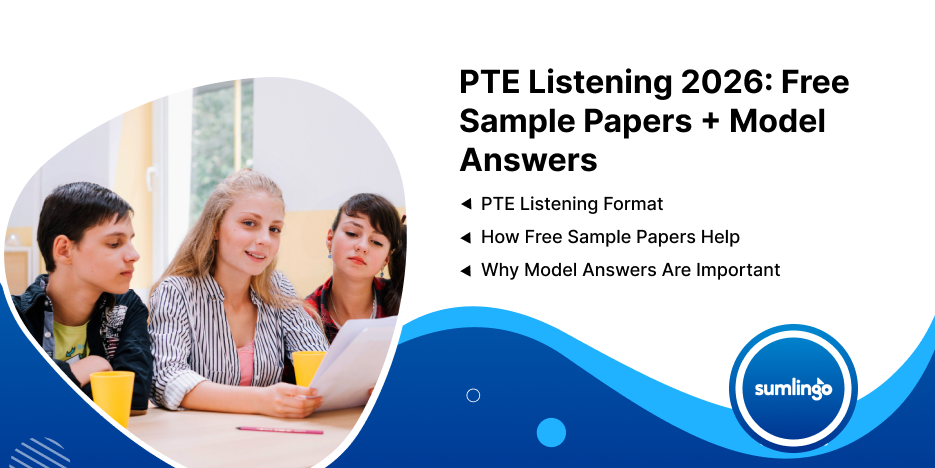The PTE Listening section evaluates your ability to understand spoken English in real-life contexts. As this section will undergo some updates in 2026, it’s important to stay ahead of the curve. One of the most effective ways to prepare is by practicing with free sample papers and reviewing model answers. These practice materials give you the chance to familiarize yourself with the types of questions you’ll encounter, the format of the test, and the level of detail required. Whether you’re a beginner or aiming for a high score, these resources are invaluable for improving your listening skills.
| PTE Listening Test Sample Papers | PDF’s |
|---|---|
| Listening Sample Paper 1 | Download Now |
| Listening Sample Paper 2 | Download Now |
| Listening Sample Paper 3 | Download Now |
| Listening Sample Paper 4 | Download Now |
| Listening Sample Paper 5 | Download Now |
PTE Listening Format
The PTE Listening section is made up of 8 task types, each designed to test your understanding of spoken English in different ways. Here’s a quick overview:
1. Summarize Spoken Text: This task tests your ability to identify and summarize key ideas from an audio recording. After listening, you’ll need to write a concise summary of the main points in 50 -70 words.
- Prompt Length: 60-90 seconds
- Skills Assessed: Listening and writing
- Number of Questions: 1
- Time to Answer: 10 minutes
2. Multiple-Choice, Multiple Answers (MCMA): In this task, you’ll listen to a recording and select more than one correct response from the given options. It assesses your attention to detail and understanding of the content.
- Prompt Length: 80-120 seconds
- Skills Assessed: Listening
- Number of Questions: 2-3
3. Fill-in-the-Blank: You’ll be given a transcript of the recording with gaps. You need to listen to the audio and fill in the missing words. This tests your ability to grasp key details and context.
- Prompt Length: 30-60 seconds
- Skills Assessed: Listening
- Number of Questions: 2-3
4. Highlight the Correct Summary: After listening to a recording, you will need to choose the summary that best represents the content discussed. This task tests your ability to identify the main points of the audio.
- Prompt Length: 30-90 seconds
- Skills Assessed: Listening and reading
- Number of Questions: 2-3
5. Multiple-Choice, Single Answer (MCSA): In this task, you’ll listen to a recording and choose the single correct response from a list of options. It evaluates your ability to grasp the main idea of the audio quickly.
- Prompt Length: 30-90 seconds
- Skills Assessed: Listening
- Number of Questions: 2-3
6. Select Missing Word: A missing word in the recording will be replaced by a beep sound. You need to choose the most suitable word from the options provided, based on the context.
- Prompt Length: 20-70 seconds
- Skills Assessed: Listening
- Number of Questions: 1-2
7. Highlight Incorrect Words: In this task, you’ll be given a transcript with errors. Your job is to identify and highlight the incorrect words. It tests your ability to listen closely and recognize mistakes in the text.
- Prompt Length: 15-50 seconds
- Skills Assessed: Listening and reading
- Number of Questions: 2-3
8. Write from Dictation: This task tests your ability to listen closely and write down exactly what you hear.
You’ll be given a short sentence, and your job is to transcribe it as accurately as possible.
- Prompt Length: 3-5 seconds
- Skills Assessed: Listening and writing
- Number of Questions: 3-4
How Free Sample Papers Help
Free sample papers are one of the best tools for practicing the PTE Listening section. Here’s how they can benefit your preparation:
- Understand Task Types: Sample papers give you a sense of the different task types, so you know what to expect.
- Familiarize with Test Format: You’ll become comfortable with the time constraints and the format of each task.
- Identify Weak Areas: Regular practice helps you spot areas where you need more focus, whether it’s listening for specific details or improving your writing.
- Get Comfortable with Accents: PTE recordings often feature different accents, and practicing with sample papers can help you get used to them.
Why Model Answers Are Important
Along with sample papers, model answers play a crucial role in helping you improve. Here’s how:
- Set a Benchmark: Model answers show you the level of detail, structure, and language expected in your response.
- Improve Paraphrasing: By reviewing model answers, you can learn to paraphrase effectively, a key skill in tasks like Summarize Spoken Text.
- See Common Mistakes: Understanding why certain answers are incorrect will help you avoid similar mistakes.
Model answers provide a clear picture of what a perfect response looks like and help you refine your approach to each question type.
Are you ready to test your skills?
Tips for Success in PTE Listening
- Practice Consistently: The more you practice, the more confident you’ll become. Use free sample papers regularly.
- Take Notes: During your practice, get used to taking quick notes. It’ll help you with tasks like Summarize Spoken Text and Fill-in-the-Blank.
- Review Your Answers: If you have time, go back and check your responses to make sure they’re accurate.
- Stay Calm: Listening tasks can be challenging, but staying calm and focused will help you pick up more details.










